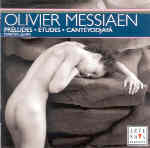Having proved his Messiaen mettle in the Catalogue d’oiseaux and Vingt Regards sur L’Enfant Jesus, pianist Martin Zehn continues his complete survey of this composer’s piano works with more modestly scaled yet no less challenging fare. The ecstatic modalism characterizing Messiaen’s mature style already had begun to take shape in his early 1929 Préludes, although hints of Ravel also permeate the piano textures. You wouldn’t know it from the nude male reposing in the cover photo, but Zehn favors clarity over sensuality, concerning himself more with linear movement than nuance and color. This particularly hits home concerning his spare use of the sustain pedal in No. 3 (Le nombre léger) and his brisk, slightly matter-of-fact approach to No. 5 (Les sons impalpables du réve)–quicker and less languorous than Peter Hill’s. Had I not been spoiled by a stunning ECM recording where Alexander Lonquich’s sharper articulation and wider dynamic range sets reference standards, I could recommend Zehn without reservation.
In Zehn’s scrupulous hands, the Quatre Études are as clear and clean as the catalog’s best versions–but again, I’ve heard more fluidity, urgency, and emotional contrast elsewhere, especially in Paul Jacobs’ classic 1976 Nonesuch recording (reissued by Arbiter). Likewise, Zehn’s forthrightly executed yet rather dry and monochrome reading of Cantéyodjâya sounds relatively two-dimensional next to Peter Serkin’s nimbler grasp of the music’s long-lined implications and more varied voicings of Messiaen’s knotty counterpoint and jangled chords.
































